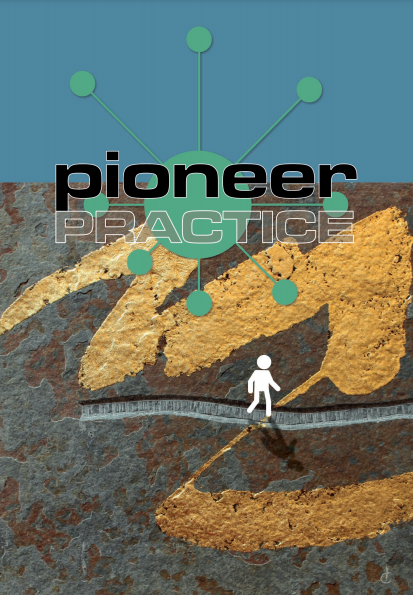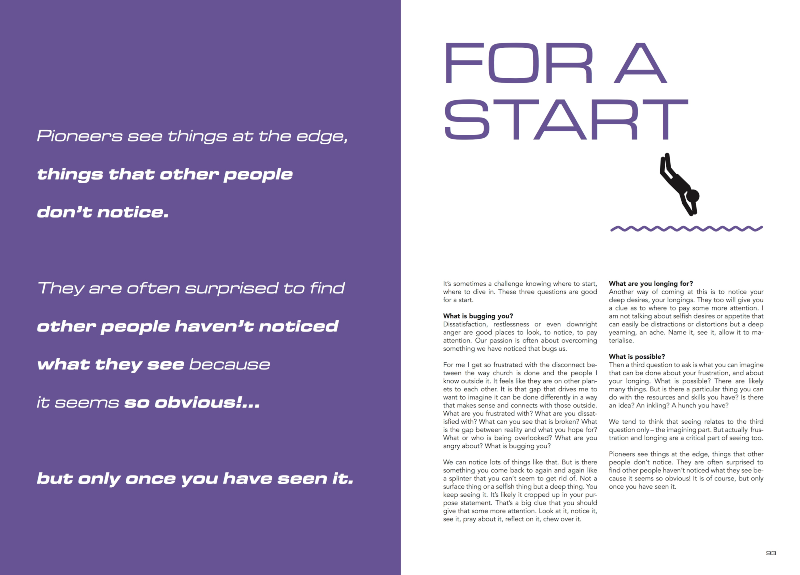A start in pioneer practice - three questions to ask
At its simplest pioneering is a combination of seeing and building, writes Jonny Baker - and here are three questions to get you started.
Jonny is director of mission education at Church Mission Society (CMS) where he founded the pioneer training programme. The questions feature in his new book Pioneer Practice
 After ten years of encouraging and training pioneers at CMS I wanted to draw together some of the practical wisdom we have learned into a very accessible format to share with others wanting to start something new.
After ten years of encouraging and training pioneers at CMS I wanted to draw together some of the practical wisdom we have learned into a very accessible format to share with others wanting to start something new.
We have previously published several books on the theology and missiology of pioneering mission but research showed me that the things pioneers said they needed most help with were things like money, admin, team, time, negotiating culture change in systems i.e. much more nitty gritty practical things, and things that you don’t get taught at theological college.
Pioneer Practice is the result. At the heart of it are around a dozen inspiring stories which delve into those questions and show timelines of how their projects developed. I have always found our students learn most from visiting and hearing about projects on the ground from pioneers that are doing it. This is then accompanied by a series of conversations and articles on the practical issues.
At its simplest pioneering is a combination of seeing and building. The seeing is a gift of imagining possibilities and dreaming up ideas, find new paths to do things. The building is the work to make something happen out of that seeing. It’s sometimes a challenge knowing where to start, where to dive in.
These three questions are good for a start. Gather a group of friends together over a coffee, a beer or a meal and see where the conversation takes you. After each question I give an example from one of the stories in Pioneer Practice.
What is bugging you?
Dissatisfaction, restlessness or even downright anger are good places to look, to notice, to pay attention. Our passion is often about overcoming something we have noticed that bugs us.
For me I get so frustrated with the disconnect between the way church is done and the people I know outside it. It feels like they are on other planets to each other. It is that gap that drives me to want to imagine it can be done differently in a way that makes sense and connects with those outside. What are you frustrated with? What are you dissatisfied with? What can you see that is broken? What is the gap between reality and what you hope for? What or who is being overlooked? What are you angry about? What is bugging you?
We can notice lots of things like that. But is there something you come back to again and again like a splinter that you can’t seem to get rid of. Not a surface thing or a selfish thing but a deep thing. You keep seeing it. It’s likely it cropped up in your purpose statement. That’s a big clue that you should give that some more attention. Look at it, notice it, see it, pray about it, reflect on it, chew over it.
Kim Brown and a few friends prayed together about those at the edges in Cirencester. Although it was a well to do market town they were struck by the number of people on the streets visibly struggling and the local parish church simply did not know how to respond. Over a number of years this eventually led to the Upper Room, a drop in centre in the town which became a home for these guys and out of which a community of disciples has grown.
What are you longing for?
Another way of coming at this is to notice your deep desires, your longings. They too will give you a clue as to where to pay some more attention. I am not talking about selfish desires or appetite that can easily be distractions or distortions but a deep yearning, an ache. Name it, see it, allow it to materialise.
Ann Marie Wilson’s longing was for a world free from FGM. Her pioneering has been to set up a charity 28toomany which works alongside others to that end. She has done an incredible job. But that longing has been an incredible driver for her.
What is possible?
Then a third question to ask is what you can imagine that can be done about your frustration, and about your longing. What is possible? There are likely many things. But is there a particular thing you can do with the resources and skills you have. Is there an idea? An inkling? A hunch you have?
Clean For Good is an ethical cleaning company in London set up out of a local church. Some research showed them that in their parish lots off migrant workers were on zero hours contracts and being treated poorly. They began to imagine that good news might look like a new kind of cleaning company. That was the possibility they saw. That company now employs around 40 cleaners who were able to be furloughed in lockdown because they had a contract with decent and fair terms and conditions.
We tend to think that pioneering relates to the third question only – the imagining part. But actually frustration and longing are a critical part too.
Jonny Baker is director of mission education at Church Mission Society where he founded the pioneer training programme – see pioneer.churchmissionsociety.org/
 These three questions appear in an article in his new book Pioneer Practice.
These three questions appear in an article in his new book Pioneer Practice.
Pioneer Practice is available from www.getsidetracked.co
Do you have a view? Share your thoughts via our letters' page.
Baptist Times, 07/07/2021